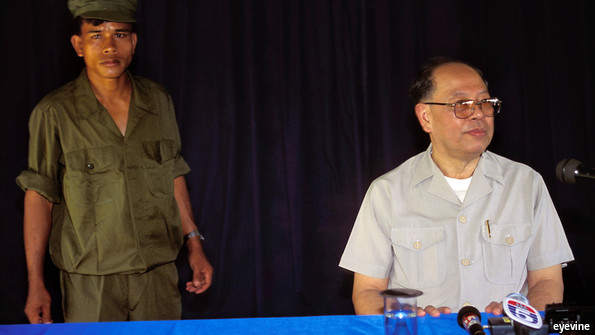 |
Ieng Sary,
foreign minister and “Brother No. 3” in Cambodia’s Khmer Rouge regime,
died on
March 14th, aged 87 IT WAS, he
said, the greatest revolution the world had ever seen. It would be
written in
golden letters on the pages of history: how the Cambodian people had
returned
to the countryside to become pure, agrarian communists, relieved of all
private
property, free of all ties of family, religion and culture, devoted
only to
Angkar (“the organisation”) and the teachings of Mao and Stalin. When
Ieng
Sary, then deputy prime minister and foreign minister for the Khmer
Rouge
regime, sent out such messages in 1975 to thousands of Cambodian
students and
intellectuals living overseas, they naturally came home—to be condemned
as
spies, thrown in jail, tortured and killed. Few survived his propaganda. There were,
Ieng Sary admitted—disarming Western listeners with his ready, radiant
smile,
as he savoured a sip of champagne—a few technical hitches along the
revolutionary way. For example, the regime had to remove everyone from
Cambodia’s cities, because there was not enough transport to bring in
food for
them. It made more sense to take the people to the countryside, where
the food
was. What he did not add was that these “new people”, once in the
fields,
became slave labour, forced into punishing manual work and so underfed
that
they tried to survive on grass; and that over the four years of Khmer
Rouge
rule perhaps 2m Cambodians, or around a quarter of the population, died
from
overwork, malnutrition and starvation, as well as mass killings. If you faced
Ieng Sary with this, he shrugged his shoulders. What did he know? As
the
foreign minister, he had to travel all the time. He was just a
secondary
figure, not privy to the policies and tactics of Pol Pot, the regime’s
“sole
and supreme architect”, as he called him. For himself, he had killed
one man—no
more—and done nothing wrong. He was a gentle person, he insisted, as he
sniffed
delicately at the bottles of French perfume he liked to buy on
first-class
international flights. What he did
not add, though most people knew it, was that Pol Pot was his chum from
the
elite Lycée Sisowath in Phnom Penh and his student buddy at the
Sciences Po in
Paris, later his brother-in-law when they married girls who were
sisters. Deep
down, Ieng Sary thought him a simpleton. He would bang on his door at
dawn in
the Latin Quarter, yelling at him to get to his Marxist studies, long
before
they both began, in 1963, to stir up revolts in the Cambodian
countryside
against the American-backed regime. Once they had seized power in 1975
Ieng
Sary was “Brother No. 3”, implicated with cosy, family closeness in the
torture
of thousands in secret prisons and afterwards in their murder. As foreign
minister his role was hypocritical, yet simple. He had to present a
disarming
face to the world, build up visceral hatred of neighbouring Vietnam and
draw in
help from China, the regime’s only friend, in the form of money,
weapons and
advisers. When the Khmer Rouge government itself was toppled by a
Vietnamese
invasion in 1979, he fled to Thailand; and there found fresh clothes,
new
sandals and a VIP air ticket to Beijing, all supplied by the Chinese
embassy in
Bangkok. His skilful contacts with China kept the movement going for
two more
decades. Sapphires in
his hands You could
say he was a proper revolutionary, in drab jacket, cap and scarf,
railing
against “economic saboteurs” who wasted food and “traitors”,
undoubtedly CIA or
KGB agents, who smoked Western cigarettes or had non-Cambodian blood.
Yet he
had been born in loathed Vietnam (his old Vietnamese name swapped for a
Cambodian nom de guerre) to a Chinese mother and a rich father, and had
become
the very model of a hated French-speaking intellectual. Despite all
that,
slippery as an eel, he triumphantly survived inside the regime. He was also
increasingly rich. The peasant-poverty enjoined by the Khmers Rouges,
and
practised by some, never appealed to him. In 1982 (the movement still
pretending to govern Cambodia from bases on the Thai border) he gave up
the job
of foreign minister to become minister of economics and finance, which
required
China’s largesse of more than $1 billion to flow through his hands. He
made
deals, too, with Thai sapphire-mining and logging companies. The rough
frontier
town of Pailin became his bailiwick, containing his large villa and
bungalows,
each with a tank parked outside, for his supporters. In 1996, sensing
change in
the wind, he persuaded thousands of Khmer Rouge troops to defect from
Pol Pot,
leave the jungle and claim an amnesty from the prime minister, Hun Sen,
and
King Sihanouk—a man to whom he had always bowed, while feeling nothing
but
contempt for him. Life was
good after the amnesty, as indeed it had always been for him before it.
His
Toyota Land Cruiser, with its darkened windows, was a common sight
outside the
capital’s best restaurants. Security guards protected his villa in an
elegant
part of town. He smoked the best cigars. There was
the nettlesome matter of a UN-backed Cambodia tribunal investigating
war
crimes, which arrested him in 2007 and put him on trial four years
later. But
it had convicted only one person, and moved so achingly slowly that it
was
never going to catch him. He waited to frustrate it with his charming,
duplicitous smile. Crimes against humanity? Moi? From the
print edition: Obituary
|
